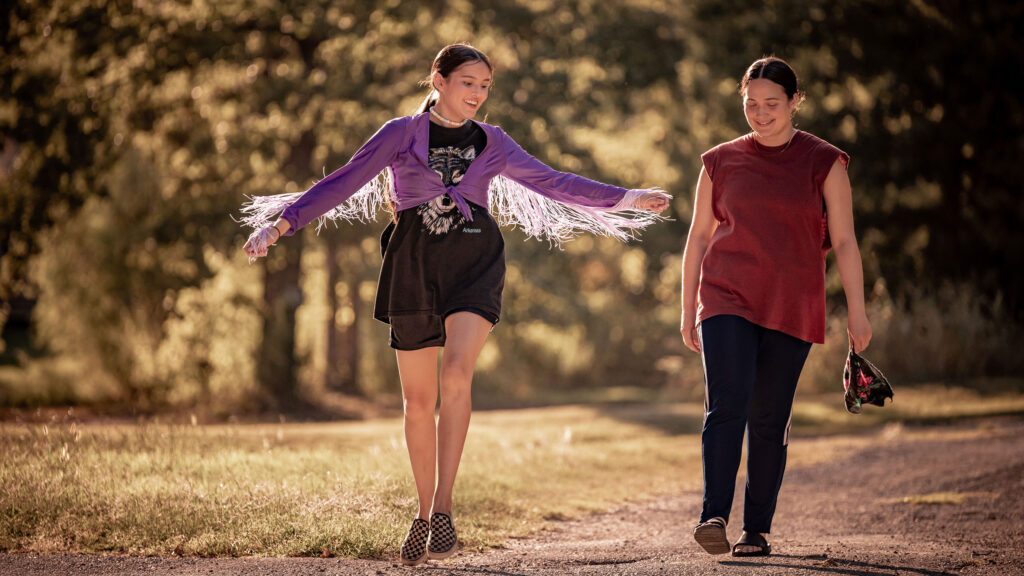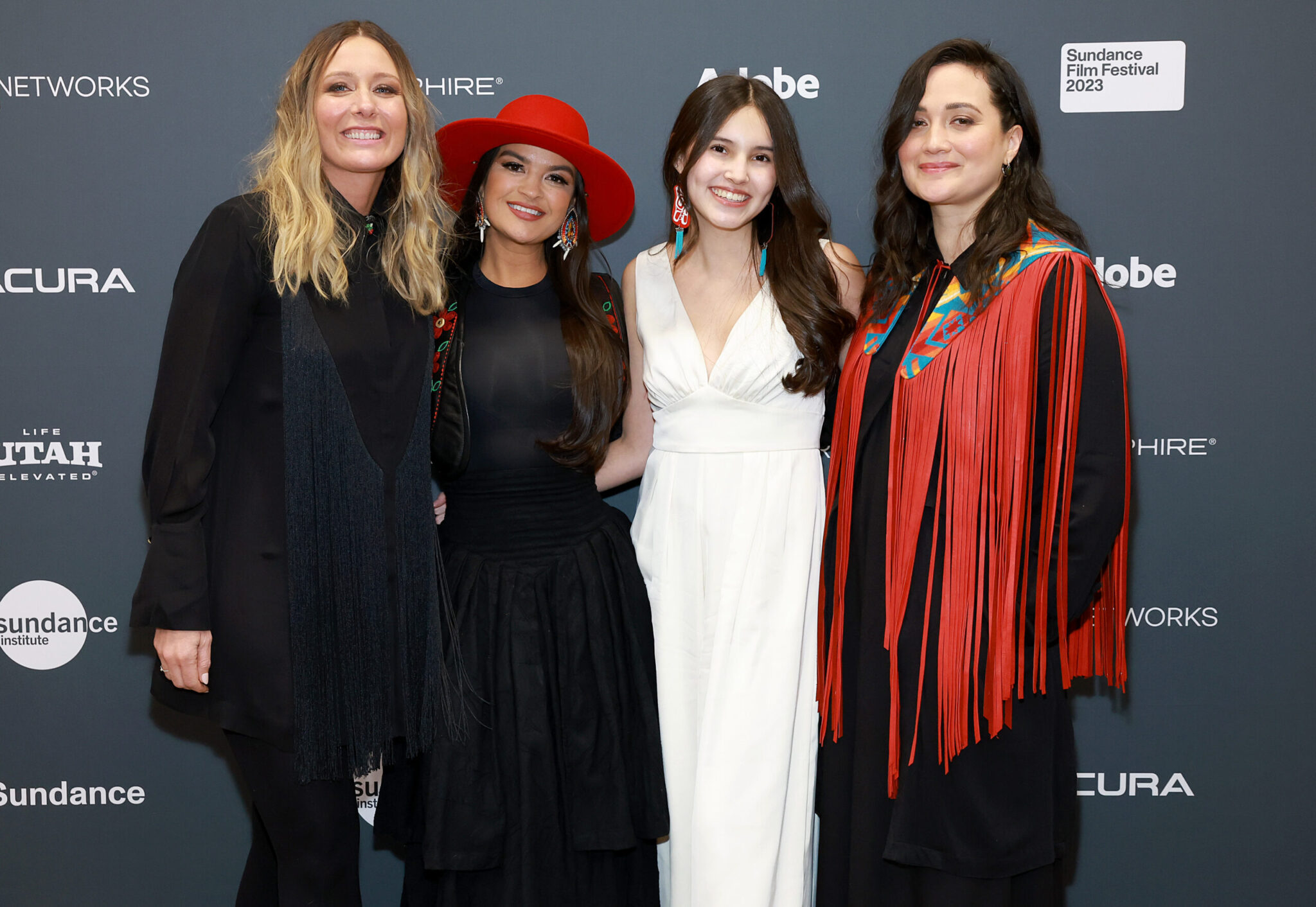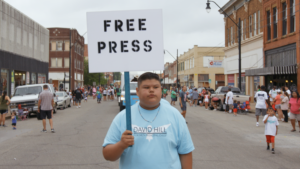PARK CITY, UTAH – JANUARY 20: (L–R) Erica Tremblay, Crystle Lightning, Isabel Deroy-Olson, and Lily Gladstone attend the 2023 Sundance Film Festival “Fancy Dance” Premiere at Eccles Center Theatre on January 20, 2023 in Park City, Utah. (Photo by Arturo Holmes/Getty Images)
By Aliese Muhonen
Another Native woman is missing in the Seneca-Cayuga Reservation in Oklahoma. The woman is Tawi, and neither her sister, Jax, nor her daughter, Roki, have seen her in nearly two weeks.
Though the characters are fictional, they are faces of a very real nightmare: the epidemic of missing and murdered Indigenous women in the U.S. According to a data snapshot from the Urban Indian Health Institute, the murder rate is up to 10 times the national average for women living on reservations, cases are backlogged into the thousands, and incidents are severely underreported.
Fancy Dance, which premiered January 20 in the U.S. Dramatic Competition at the 2023 Sundance Film Festival, offers a nuanced portrait of the crisis and its effects on Native women and their families.
Like the widely acclaimed thriller Wind River (which premiered at Sundance in 2017), Fancy Dance offers commentary on the crisis by pairing a compelling mystery with unflinching, sincere portrayals. But this time the story is told from Native women’s perspectives.
Director Erica Tremblay returns to the Festival (her short film Little Chief screened in 2020) with a feature debut that comes straight from her history and heart. A member of the Seneca-Cayuga Nation herself, Tremblay drew from her own experiences and those of her relatives: witnessing law enforcement’s half-hearted attempts to search for missing women, cases getting caught in jurisdictional quagmire between U.S. and tribal police, and Indigenous people resorting to substance abuse and crime as they struggle to survive.
Despite the heaviness of these issues, the film has a lightness and warmth in the relationships between its characters — especially in Jax and Roki’s aunt-niece bond. That’s thanks to Tremblay and her co-writer Miciana Alise (who is also Native), who were determined to genuinely represent tribal women’s lives and attitudes.
At the live Q&A following the premiere, Tremblay relates how she learned of, and was fascinated by, the Cayuga tribe’s matriarchal emphasis and structure while studying the Cayuga language in a 3-year immersion program in Canada. The feminine relationships were “a beautiful cornerstone of the community” she hadn’t been aware of, and wanted to make a film about.

“Everyone that you know [in tribal communities], in some way, has been touched by [the missing and murdered Indigenous women crisis],” she says. “For me [Fancy Dance] was about showing how this matrilineal relationship, and how this love and this bond could traverse that. And how through [Jax and Roki’s] care for each other, they could rise above all of those challenges.”
“When [Alise and I] were writing the script, we wanted it to feel very authentic to the communities we grew up in, which were filled with lots of just like, cheeky laughter, but also this idea of figuring out a way to make it work,” Tremblay continues. “We wanted to have a very important conversation about these things that impact our lives on a daily basis, but we wanted it grounded in love, and I hope that’s what we did.”
The film’s Jax (Lily Gladstone) has certainly seen her fair share of tribulations. When she isn’t searching for her sister and stealing to make ends meet, she cares for 13-year-old Roki (Isabel Deroy-Olson), and teaches her tribal traditions and language.
Roki is approaching womanhood (in more ways than one), and is obsessed with performing the titular Native fancy dance at an upcoming powwow in Tulsa with her mom. But that’s looking less and less likely as the search for Tawi stalls and Jax’s criminal background threatens her guardianship. And no, the ballet class Roki’s white grandparents offer to sign her up for is not a suitable replacement for fancy dancing. “It’s more than just dancing,” she tells her grandmother. “It’s a way to be together. It’s not like you take a class or something.”
Developed with the support of Sundance Institute’s Screenwriters Lab, Directors Lab, Creative Producing Lab and Indigenous Intensive, Fancy Dance is not only a tribute to the suffering of the victims and their families and a cry for justice; its authentic portrayals offer a brave commentary on trauma-induced inherited behaviors that contribute to a cycle of poverty and violence.
As Roki’s determination to go to the powwow increases, the impressionable teen repeats her aunt’s criminal behaviors out of desperation (and expresses confusion about the ethics of when to commit them).
“We wanted to show all of that complication and honesty and truth in what they were doing,” Tremblay says, adding that stealing is sometimes a necessity for survival on reservations, and citing the real-life example of one of her family members having to steal toilet paper and soaps from a casino in order to equip the underfunded local school. “Jax wasn’t perfect, and the things she was teaching Roki weren’t perfect, but they loved each other, and in the end I think that’s what matters.”
Yet even when the characters’ methods defy the law, we can’t help but root for them; Gladstone and Deroy-Olson’s irresistible performances make it impossible not to. Jax will stop at nothing to keep her family together and native traditions alive for her niece, and Roki’s hopeful optimism to experience a tradition important to her is heartbreaking.
The sense of hope permeates the story, but it’s always bittersweet. The greater tragedy of the characters’ circumstances (and horrifying reality) still looms.
“Part of the reason it was so important for me to be a part of this film is that I believe in the power of story,” Alise says. “I believe that at the end of the day, we are all human and we can find that humanity in each other’s stories. And it’s one of the most powerful ways to make a change. So while my tribe and Erica’s tribe continue to do that work [of finding missing women], we also need to share what we’re fighting against and why this is important, and there are people all across this country like Roki and Jax that are fighting just to hold onto that little piece of life. And I wanted to do them justice and bring back all the Tawis that we can.”










